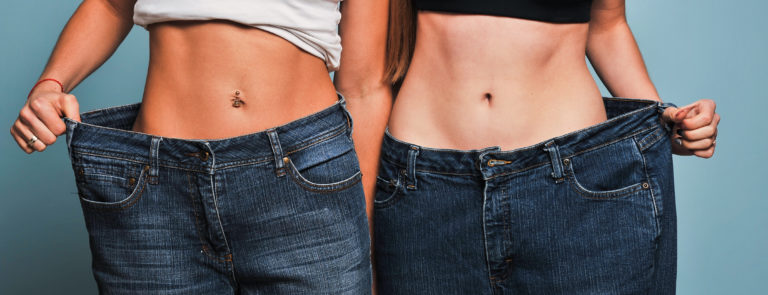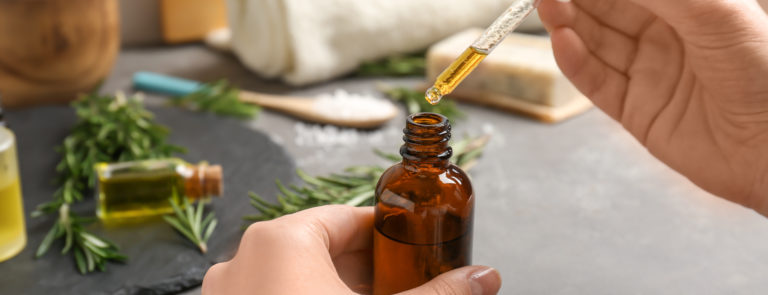10% off £35
Your guide to henna hair dye
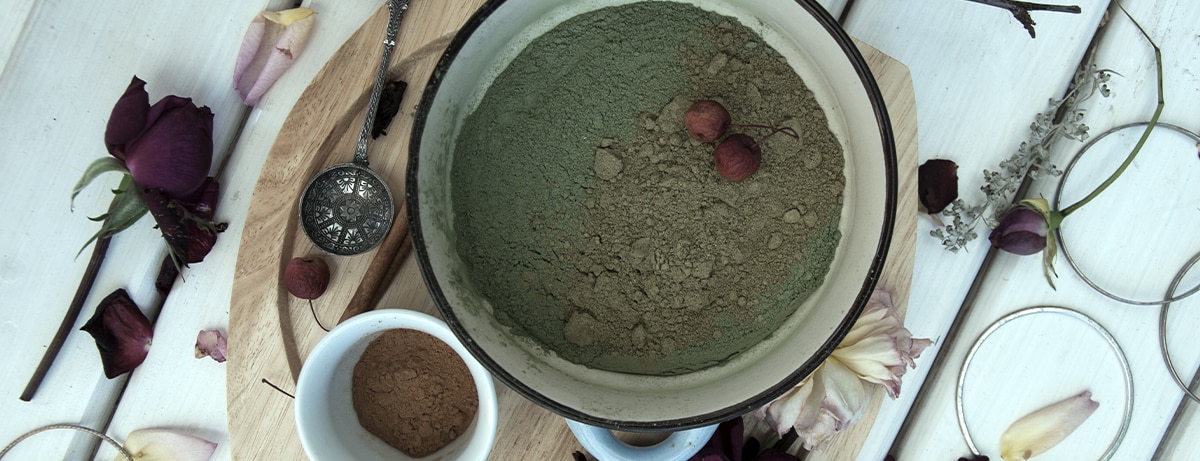
Henna is a natural plant dye, thought to date back to the 7th century BC.1 It has been used for centuries to create intricate body art and as a conditioning colour treatment for hair.
When used as a natural hair dye, henna offers glossy, richly-hued locks without the damage associated with most commercially available hair dyes.
But what exactly is henna hair dye? What advantages does it offer over regular hair dye? Are there any risks? And is it true that once you start using henna, you can’t go back?
In this article, we look at henna hair dye and whether it might be the right choice for your locks.
What is henna hair dye?
To make henna hair dye, the leaves of the lawsonia inermis – or henna plant – are harvested and ground into fine, richly pigmented powder.2 This powder is then mixed with liquid to create a thick, mud-like paste which imparts a deep stain on hair.
Pure henna is often mixed with different plants to offer different colour results. These include:3
- Cassia plant powder for lighter shades, like strawberry blonde and coppery red (from light starting shades – cassia won’t lighten hair).
- Indigo plant power for dark shades, like chocolate brown, auburn, burgundy and black.4
As a rule of thumb – using pure henna alone will result in a deep red henna tone, then the more indigo that’s added to the mix, the darker and deeper the colour will become.
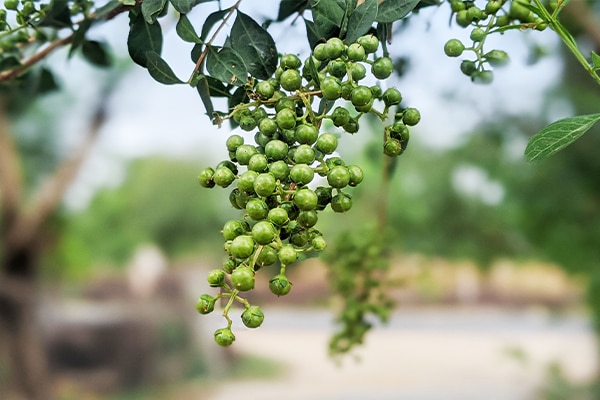

What are the benefits of using henna hair colour instead of regular hair dyes?
Fancy trying natural red henna hair colour instead of your usual box dye? We don’t blame you. Especially as there are lots of benefits to using henna. Check them out here:
1. It’s plant-derived
Henna comes directly from plants, therefore, does not contain the potentially harmful additives sometimes found in commercially produced hair dye, such as toluene and para-phenylenediamine (sometimes referred to as PPD). This PPD substance is one of the most common reasons people are sensitive to hair dye.5,6,7
2. It doesn’t weaken the hair to colour it
2. It doesn’t weaken the hair to colour it
Many permanent hair dyes cause structural changes to your hair that can, in turn, damage it, making it more prone to breakage.8,9
In contrast, henna does not penetrate the central cortex of the hair or alter the structure or texture of the hair.I Instead, it coats the outer part of the hair shaft to give it colour.10,11
– which have been known to roughen and damage the cuticle in order to impart the colour – henna strengthens and protects hair strands by binding with the hair’s cuticle and strengthening it from within.5
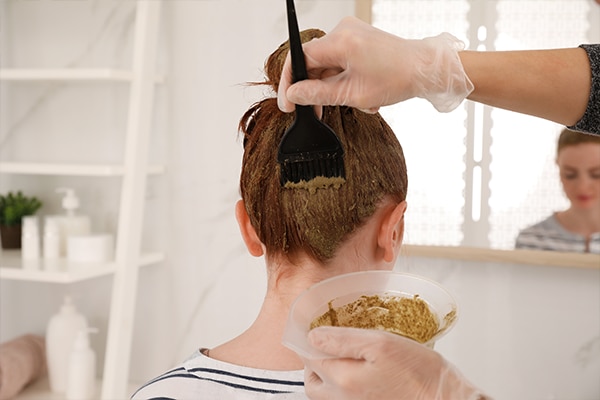

3. It has fairly neutral pH
Henna has a pH of around 5.5 – much closer to that of skin than permanent hair colours, which usually contain pH levels between 9.0 to and 11.0.12,13 This lower pH level (less alkaline) helps to reduce cuticle damage and hair fibre breakage.14
Drawbacks of using henna hair dye
1. Natural colour variation
The colour results of henna can be somewhat unpredictable – especially if you’ve got lots of greys or have previously dyed your hair. The natural variations in tone and condition can cause each strand to pull the henna pigment differently, creating a range of shades.
We recommend doing a strand test before trying henna hair colour.
2. Application can be messy
Don’t let the messy nature of henna application take you by surprise. Once mixed, henna's consistency is like watery mud, which can get everywhere. Henna is a natural dye so make sure you are properly prepared before getting started by covering your clothes and any furniture with an old towel or cover.
3. It’s difficult to cover if you fancy a change
It’s true the deep stain that henna leaves on the hair is difficult to shift. As henna binds with the hair cuticle, any dye applied on top may not take properly.
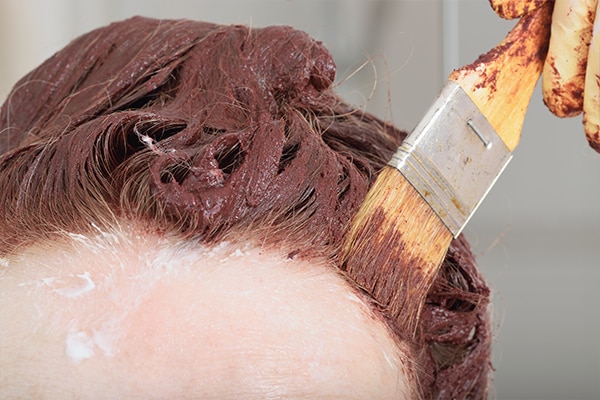

How to dye your hair with henna
Whether you’re aiming for vibrant red hair with red henna hair dye or a deep dark shade, the application process is pretty much the same.
1
Step 1: Choose your henna
You have two options – henna powder or pre-mixed henna dye. The pre-mixed dye might be better for beginners, as the addition of liquid and/or other plant dyes is done for you.
Be sure to check that the pre-mixed product you use is made of pure henna and plant dyes, with no additives, chemicals or metallic salts.15
If you do go for powder, you can either use it alone or combine it with another plant powder – such as indigo or cassia – to your desired depth. Then, you’ll need to combine it with a warmed acidic liquid (lemon juice, vinegar or orange juice all work!) until you reach a smooth mud-like consistency.16
Rest the covered mixture for a few hours at room temperature to give the dye pigments a chance to release.
2
Step 2: Patch test
Before you apply any henna to your hair, be sure to carry out a patch test 24-48 hours prior. If you experience any redness, itchiness, swelling or signs of irritation, stop using the product and seek medical assistance.17
3
Step 3: Application
This is the fun (and messy) part. Have several old towels at the ready, wear gloves and prep your hairline with barrier cream (petroleum jelly would do the trick!) before you begin.
Apply the henna paste thickly to your hair section by section. You’ll need lots of product to really coat each strand.
Cover with loose cling film or a shower cap.
4
Step 4: Development
Unlike most hair dyes which need well under an hour to develop, natural henna takes its time.
Leave henna on the hair for 3–6 hours. Colour result can depend on the original colour and condition of the hair, but generally deepens and darkens the longer you leave the henna on the hair.
5
Step 5: Rinsing
Using gloves, rinse your hair using the showerhead for as long as it takes for the water to run completely clear. No need to shampoo or condition. After gently towel-drying, follow with your favourite serum or hair oil.
If you feel the colour isn’t strong enough, you can repeat the process after a day or two to achieve a deeper result.
Are there any risks to using henna?
Are there any risks to using henna?
You may have heard of people experiencing allergic reactions to ‘black henna’, the type used in black temporary tattoos. This stuff isn’t henna at all, but a chemical dye called para-phenylenediamine.18
This commonly causes allergic reactions, and anything claiming to be black henna for hair or black henna hair dye containing this ingredient instead of natural henna should be avoided. 19 Pure henna hair dye made from the henna plant is generally very safe to use and well-tolerated.
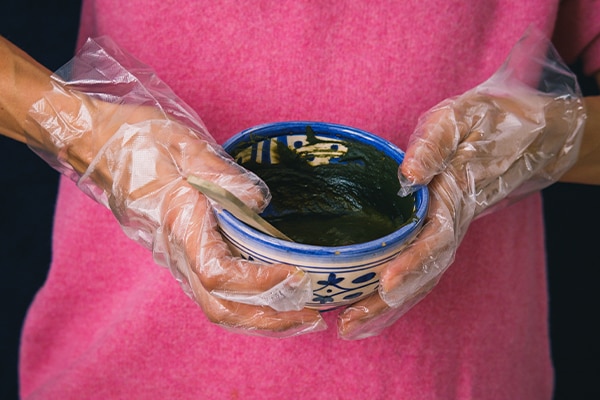

Henna FAQs
This depends on the condition of your hair and how often you wash it, but henna usually stays vibrant for around 2 months before gradually fading. The henna tint may never completely leave the hair.
A henna shampoo may help you keep the vibrancy longer - although these don’t add colour to your hair.
No – pure henna is not damaging to the hair as it doesn’t roughen or strip the hair’s cuticle. In fact, henna usually makes hair stronger and shinier.
Using henna for can be a great way to add a reddish, auburn tint to your silver locks. Although, be aware that grey strands might not pick up henna the same way as other strands do.
As grey hairs tend to be coarser with a rougher surface, they can be a little trickier to colour – in some cases even rejecting the colour, especially near the roots.20 But this is often the case for standard box dyes as well, so try not to let it deter you from giving henna a go.
As it can sometimes be hard to predict the exact shade your hair will come out when using henna, we recommend selecting a shade that is slightly lighter than the desired colour (e.g. medium brown for dark brown hair). That way, if the resulting colour doesn’t turn out quite how you had imagined, you can always go darker.
In the case of covering grey hair with henna, it is important to allow at least 72 hours between applications to allow enough time for the pigment to oxidise and settle.21
Summary:
- Colour results can be variable with henna – so always do a strand test!
- Henna strengthens the hair fibre
- Henna fades gradually but the colour never washes out
The final say
If you’re looking for a natural alternative to standard box dyes, henna may be the choice for you.
Are you a total hair dye newbie? Don’t worry, our guide covers everything you need to know about dyeing your hair to get you started.
If you have sensitive skin, eczema, psoriasis, acne or rosacea, consult a dermatologist before trying any new techniques.
1. http://hennaartconnection.com/history-of-henna
2. https://www.earthhenna.com/about/about-henna/
3. https://botanicalcrown.com/blogs/news/mixing-henna-and-other-color-herbs
4. https://www.tapdancinglizard.com/henna-for-relaxed-and-natural-hair/
5. https://www.cdc.gov/niosh/topics/toluene/
6. https://pubmed.ncbi.nlm.nih.gov/30474463/
7. https://www.nhs.uk/conditions/hair-dye-reactions/
8. https://aussiehair.com/a-beauty/damage/does-dying-hair-damage-it/
9. https://www.ncbi.nlm.nih.gov/pmc/articles/PMC10232955/
10. https://www.thoughtco.com/salon-hair-color-chemistry-602183
11. https://stylecaster.com/feature/henna-hair-dye-428897/
12. https://www.ncbi.nlm.nih.gov/pmc/articles/PMC4158629/
13. https://www.hairman.com/whats-the-right-ph-level-for-your-hair/
14. https://www.headandshoulders.co.in/en-in/healthy-hair-and-scalp/hair-care/tips/ph-of-hair-and-scalp
15. https://hairpros.edu/why-does-henna-affect-hair-dye/
16. http://www.hennapage.com/henna/how/sour.html
17. https://www.babtac.com/blog/2018/03/122-patch-testing-update
18. https://www.ncbi.nlm.nih.gov/pmc/articles/PMC5385600/
19. https://www.nhs.uk/conditions/hair-dye-reactions/
20. https://4rootz.com/gray-hair-resistant-to-color/
21. https://www.ancientsunrise.blog/henna-for-hair-101-orange-panic/

